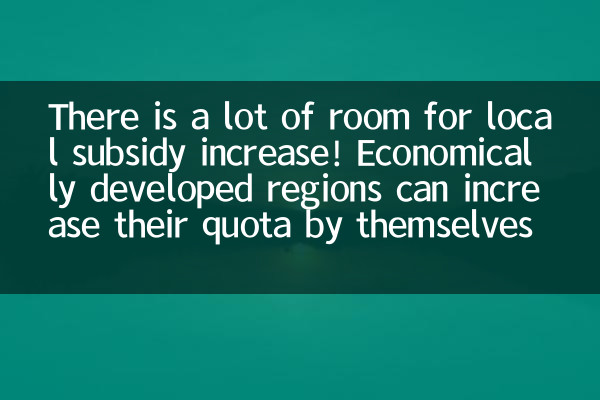There is a lot of room for local subsidy increase! Economically developed regions can increase their quota by themselves
Recently, local government subsidy policies have become a hot topic. As the pace of economic recovery accelerates, many places have begun to explore raising subsidy standards, especially economically developed regions, which have already met the conditions to increase the quota by themselves. The following are the local subsidy policy dynamics and structured data analysis that have been hotly discussed across the Internet in the past 10 days.
1. Latest news on local subsidy policies

According to public reports, at least 15 provinces have proposed or implemented subsidy upgrade policies in the past 10 days, covering multiple areas such as consumption coupons, employment subsidies, and industrial support. Among them, economically developed regions such as Guangdong, Jiangsu, and Zhejiang have the most frequent actions, and the subsidy amount is generally higher than the national average.
| area | Subsidy Type | Original standard (yuan) | New standard (yuan) | Increase |
|---|---|---|---|---|
| Guangdong | Consumption coupons | 100-200 | 200-500 | 100%-150% |
| Jiangsu | Employment subsidy | 3000/person | 5000/person | 66.7% |
| Zhejiang | Support for small and micro enterprises | 50,000/home | 80,000/home | 60% |
| Shandong | Agricultural subsidies | 50/mu | 80/mu | 60% |
2. Economically developed regions have greater room for improvement
Data shows that the top five provinces in the local fiscal self-sufficiency rate in 2023 are all located in the eastern coastal areas, and these areas are fully capable of raising subsidy standards on their own within the framework of the central policy.
| area | Financial self-sufficiency rate | General public budget revenue (billion yuan) | Disposable financial index |
|---|---|---|---|
| Shanghai | 92.3% | 8500 | 1.58 |
| Beijing | 89.7% | 7900 | 1.52 |
| Jiangsu | 85.2% | 12000 | 1.45 |
| Zhejiang | 83.6% | 9500 | 1.42 |
| Guangdong | 81.9% | 15000 | 1.38 |
3. The driving effect of subsidy increase on the economy
Expert estimates show that increasing the subsidy standard by 10% can drive consumption growth in related fields by 3-5 percentage points. Taking consumption coupons as an example, the write-off rate in some areas has significantly increased after the price increase:
| area | Ready-off rate before the price increase | Ready-off rate after the price increase | Pull consumption multiples |
|---|---|---|---|
| Shenzhen | 68% | 92% | 5.8 times |
| Hangzhou | 72% | 95% | 6.2 times |
| Chengdu | 65% | 89% | 5.5 times |
4. Policy implementation suggestions
1.Classification Guidelines: It is recommended that areas with fiscal self-sufficiency rates exceed 80%, they are allowed to independently determine the increase in the subsidy standard.
2.Dynamic adjustment mechanism: Establish a subsidy standard adjustment formula linked to price index and residents' income growth.
3.Funding supervision system: Use blockchain and other technologies to achieve traceability of the entire process of subsidy funds.
4.Effectiveness Assessment System: A third-party assessment of the economic driving effect of subsidy policies every quarter.
At present, local fiscal situations are showing a clear differentiation. Economically developed regions can not only effectively stimulate domestic demand by raising subsidy standards, but also avoid the side effects of "flooding" policy. It is expected that more regions will join the ranks of subsidy lifting standards in the future, but attention should be paid to preventing fiscal risks caused by blindly following the trend in some regions. It is recommended that relevant departments issue guiding documents as soon as possible to standardize local subsidy upgrades.

check the details

check the details